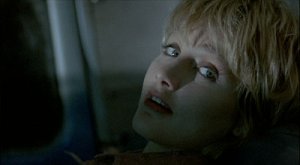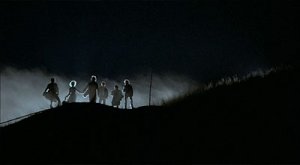Near Dark
Sunday, December 13th, 2009 • Horrorthon Posts / Horrorthon Reviews
Horrorthon ’09 is “officially” over (and I’ve already done my summation), so I don’t feel compelled to do a particularly circumspect job on this flick. I wasn’t even going to review it, except I’m a little bit irritated because I feel like every time I turn around these days I’m dealing with James Cameron, and damned if my experience with this vampire movie doesn’t fall right into that category.
I’ve been hearing about Near Dark since it came out (in the late ‘80s), always in glowing terms, with everyone insisting that I see it. As far as I can tell it’s a beloved, favorite example of the genre. But what I wasn’t quite picking up on was the telltale detail that it was directed by Kathryn Bigelow. And this turns out to be a real dealbreaker, not only because she’s terrible (take a look at Blue Steel or Strange Days if you don’t believe me) but because she’s a pure Cameron minion, who was making movies under his ham-handed, super-obvious, egomaniacal tutelage for several years (while being married to him). Everybody made a big deal about how she’s female and therefore it’s “interesting” that she directed the execrable Blue Steel (in which cop Jamie Lee Curtis has to shoot psycho lover Ron Silver) and especially “interesting” that she directed Point Break (“100% pure adrenaline!”) which I have not seen, but which I’m not exactly optimistic about. But it’s just not that interesting; it’s merely an excuse to give her credit for only half-knowing how to do anything. (I’m not saying female directors are inept, obviously; I’m saying that Bigelow is an inept director who gets undue credit simply because it’s unusual for a woman to be directing action movies.) It’s more of Cameron’s ridiculous “feminist” posturing.
Earlier this year my friend Alex tried to induce me to go with him to see Hurt Locker, which, like the rest of Bigelow’s oeuvre, is supposed to be so brilliant, but once I saw her name as the director the jig was up and I demurred. He reported back that the movie was “well-intentioned but strangely disappointing,” which is exactly how I feel about Near Dark; after all the buildup it’s just an ineptly-told vampire story, with the same kind of leaden plotting and scenery-chewing acting as Strange Days (a truly horrible movie), and with what seems like most of the cast of husband-to-be Cameron’s Aliens (Lance Henrickson, Bill Paxton, Jeanette “Vasquez” Goldstein) reproducing their signature schtick. There’s even a theater playing Aliens in the background of one shot, just in case you miss the point.
The premise is suggestive, but the premise is always at least “suggestive” in Kathryn Bigelow movies. The concept of a group of vampires operating like an outlaw biker gang, moving around the American Southwest in search of their prey, is kind of cool, and their power structure and methodology is intriguing. But they’re pretty lame vampires; they don’t obey the standard vampire rules (since Bigelow doesn’t have the directing chops to create sequences where they’d be bats or flip sideways and disappear or suddenly have fangs, and she and her co-writer don’t care anyway) and they don’t seem supernatural at all. The actors who aren’t from Aliens (Adrian Pasdar as Caleb, the reluctant new recruit, and Jenny Wright as Mae, his undead tutor) are colorless and lame. The second act builds, not to a suspenseful or exciting sequence, but to a Cameron-style ridiculously-overblown shoot-out (with big vehicles colliding); some of the shots are in slow motion, Peckinpah style, but none of it has the balletic grace that Cameron himself can always supply. (There are ten-minute stretches of Terminator 2 Judgment Day and Aliens that are sheer kinetic perfection; Bigelow has no idea how to construct anything nearly so sublime.) Then the plot takes a truly ridiculous hard left turn, violating vampire principles nearly beyond recognition before climaxing with more truck collisions and gasoline fireballs and cowboy bullshit, and a final ending that (like all Cameron-esque stories) gets lost between macho nihilism and cornpone sentimentality.
I shouldn’t be so irritated by Near Dark except that I feel ripped off, and, worse, I feel ripped off by James Cameron, which is a sensation I’m just awfully tired of. Of course his lame girlfriend director has the same problems as he does (super-obviousness, pretentiousness, a nerd’s unquenchable desire to be “badass,” and a bizarre faith in Jeanette Goldstein’s acting ability). Of course there are legions of fanboys and fangirls going bananas over what turns out to be an artlessly violent comic strip of a movie. (I’ve got nothing against comic strips or movie violence, obviously, but there’s no other way to put it.) Bigelow is the kind of filmmaker who wants it both ways—who wants to be given credit for “playing with the boys” (in both senses, in Bigelow’s case) but simultaneously expects to be given special dispensation for inability to cover the bases, on the grounds that this “unconventional” approach is somehow preferable. It’s like Tim Burton sneering “I’m not interested in ‘what a great shot.’” (Convenient!) According to fans on IMDB, I’m supposed to be “impressed” that Near Dark has no effects shots, exactly the way I’m supposed to be “impressed” that M. Night Shyamalan disdains all optical/digital/visual trickery, since it would somehow compromise his “pure-film” vision. Sorry, no sale.
ADDENDUM: P. S. It’s not scary.


